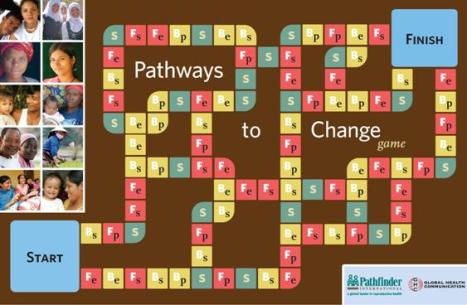Pathways for Change: For A Community That Plays Together
“Human behavior flows from three main sources: desire, emotion, and logic” - Plato
While Plato seems to have figured out this mysterious algorithm to understand the root of behaviors, the human species can be quite unpredictable at times. We eat food that we know is bad for us, we smoke cigarettes, and don't recycle everything we could. Sometimes our behaviors do not reflect our desires, emotions, or our logic.
How can we make changes in the world that involve people changing their daily behaviors? How can we sustainably improve the health of community members when their actions are unpredictable?
A new educational tool, called Pathways to Change, is a unique board game that addresses raises these concerns. In fact, this game would be an excellent resource for any international development effort seeking behavioral change on the ground.
Pathways to Change: a Board Game
The game is played by community members themselves, and moderated by an outside member. The ingenuity of the tool comes from the benefits of the game to both players and moderator. The community members playing the game are increasing their understanding, as they discuss facilitators and barriers to change and whether these forces are personal, social, or environmental. They also learn which of these change-related ideas are shared and which are more personal and idiosyncratic.
The community discussions are equally beneficial to the moderator because the game serves as a data collection tool, providing useful information about the target population's perspective on behavior change, including members' perceptions of local facilitators and barriers.
Here's How to Play
The game should be played with multiple teams, each with 3-6 community members (small enough to allow for rich discussions). The game begins with each team being assigned a character profile loosely detailing a hypothetical situation that is likely to occur locally, and that involves a behavior that needs to change. Each profile briefly addresses the situation that must change and the objective of the game for that team. Here are some examples:
Marie is 21 and lives on her own in your community with her two children. She went to high school, but cannot find a good enough job to support herself and her children. Several boyfriends pay some of her bills. Objective: Insist on using condoms with all boyfriends.
Amir is a 45-year-old part-time farmer, but he also works part-time in a mechanic’s shop in the district capital, two hours from the farm. His boss is threatening to fire him because he misses so much work. When he is in the capital, Amir uses injectable drugs and visits sex workers. His wife in the rural area and their five children do not know anything about this. Objective: Seek drug counseling.
Teams move about a board that is produced in the local language or in a low-literacy symbol-based version. The board is comprised of squares representing setbacks, facilitators, and barriers. The moderator keeps lists of the setbacks, facilitators, and barriers that the group discussed, as well as whether the facilitators and barriers were personal, social, or environmental.
Setbacks are life events that make it harder for the individual to change. Barriers are obstacles to change while facilitators are conducive to change. Barriers and facilitators may be personal, in that aspects of someone's personality, for example, may affect their willingness or openness to change, their arrogance about their life situation, or their shyness and ability to discuss personal matters with others. Barriers and facilitators may also be social (related to interactions in their social network, including parents, religious figures, medical professionals, etc.) or environmental (from the material world around us, including the type of economy lived in, the number of medical clinics available, and the general availability of resources).
Throughout the game, the moderator notes all of the setbacks, barriers, and facilitators that group members identify as they move about the board and evaluate their character’s efforts to reach a desired goal (e.g., use condoms, seek counseling).
Pathways to Change is Also a Storytelling Medium
Moving about the board collecting useful “data” is the group's first task. Once the groups have accumulated long lists of setbacks, barriers, and facilitators, their next task is to tell a story. The next hour or so of the game is spent creating a narrative surrounding the group's character of focus.
Teams may enjoy sharing their stories in an optional story competition where small prizes are won for stories that are realistic, entertaining, and provoke discussion.
If the moderator comes across exceptional stories, he/she may also take steps to get the stories heard more globally. For example, radio spots may be created with professional actors, the story may be given to a theater group to perform, etc.
Everyone Has a Story
Every person on this Earth has a story and each story is wrought with colorful characters and active scripts. Pathways to Change is a great tool to help us share our stories, and create new ones together that represent our lives in powerful ways that can lead to sustainable change.
Talking about my personal problems is a bit overwhelming in any professional or group setting. But if I can play a game with my community, then we can blend our perspectives into a voice that resonates with our collective experience. Then we have a more confident, louder voice. Then we have a story to tell.
This multifaceted tool that can be used in many development contexts. It simultaneously collects data about current issues facing a target population while members actively discuss and reach agreement about normative problems and solutions faced by the local community. The game cleverly breaks down barriers by having game participants discuss hypothetical characters and situations rather than themselves; allowing for a more comfortable and active discussion of barriers that affect their likelihood to change.
Download and read the entire publication (explaining the game in greater detail) here.


